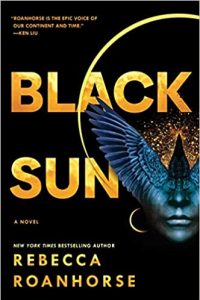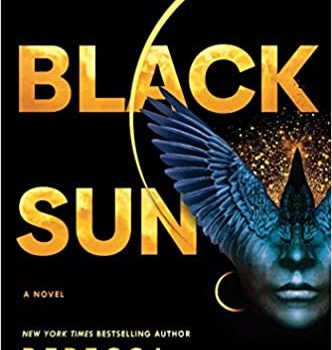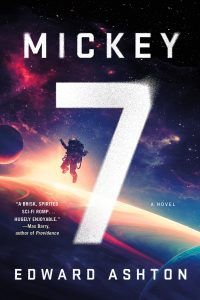Alex Brown Reviews Black Sun by Rebecca Roanhorse
 Black Sun, Rebecca Roanhorse (Saga 978-1-534-43767-8, $27.99, 464pp, hc) October 2020. Cover by John Picacio.
Black Sun, Rebecca Roanhorse (Saga 978-1-534-43767-8, $27.99, 464pp, hc) October 2020. Cover by John Picacio.
“Today he would become a god. His mother had told him so.” Rebecca Roanhorse kicks off her latest novel, Black Sun, with an opening line that hits hard, then rolls into one of the best first chapters I’ve read in a very long time. After I finished it, I had to set the book down and walk away for a bit to process what just happened. As I kept reading, I found myself constantly needing a break and to remind myself to breathe. Every subsequent chapter, from the moments of quiet reflection to the scenes of frantic action, lived up to the high expectations set by the first.
This is the tale of four people: Xiala, the exiled sea captain; Naranpa, the priest who crawled her way from the depths of poverty to the heights of leadership; Okoa, the warrior prince; and Serapio, the man born to become a god. All live on the Meridian, a swath of land surrounding a great sea and studded with several large cities. Everyone on this corner of the continent is united under the steady gaze of the Watchers; each region has its own distinct language and cultural traditions, none more so than the Teek, a seafaring, island-dwelling people with a magical bond with the ocean. Xiala is Teek, but a mysterious incident drove her out of her homeland. Desperate to escape a prison sentence, she accepts a job of ferrying Serapio to the holy city of Tova. The job sounds simple, but complications quickly arise, and Serapio entangles himself right in the middle of it.
Back in Tova, Naranpa is dealing with her own trials. Her goals of providing care and protection to her people are being undermined by scheming colleagues who want her power for themselves. Centuries before, the Watchers presided over the slaughter of most of the Carrion Crow clan, and now the descendants of the survivors await the return of their vengeful god. After the death of a Carrion Crow leader, Okoa returns home and straight into a crush of backroom deals and political machinations. Something is rotten at the heart of the Watchers and Carrion Crow, but Naranpa and Okoa may not be able to fix it. Time is running out as the winter solstice solar eclipse rapidly approaches, bringing with it a cruel ending and a bloody beginning.
Black Sun may be Rebecca Roanhorse’s first work of epic fantasy, but the skills she honed writing her four previous novels and more than a dozen short stories have led to this brilliant work of art. The cast of characters is huge and varied, the worldbuilding vast yet detailed, the magic complicated yet grounded. Queerness is common and accepted without much hand-wringing. Several characters are openly queer, including non-binary characters who use neo-pronouns. Women and non-binary/trans people move about in the social hierarchy and occupy positions of power as frequently as men do. Whatever bigotries people have, gender and sexual/romantic identities aren’t, in general, part of it.
It’s clear Roanhorse spent a lot of time researching Indigenous cultures. Although she picks and chooses from a wide range of pre-contact societies from across the Americas and Pacific Islands, she does so with awareness and respect. It feels like showcasing Indigenous cultures rather than appropriating. Observant readers can spot the influences from Cahokia, ancient Polynesia, etc., but she has added enough layers of fantasy to them that the fictional societies don’t feel like replicas of the real ones.
Roanhorse also explores the concept of the hero. Serapio’s Carrion Crow followers believe he (or, more specifically, the god he is destined to become) is a champion who will punish the wicked Watchers for their genocidal crimes, but there is nothing golden or pure about him. He may be perceived as a hero, but he kills and maims as readily as he empathizes and helps. Serapio was forged into the Chosen One through pain and sacrifice, and his moment of triumph must come at the cost of countless lives. The Watchers also consider themselves heroes. Their order was created out of the chaos caused by a brutal war and it maintains peace through tradition and domination. They cannot see – or have chosen to ignore – their own hypocrisies. Naranpa wants to reform the system as much as Serapio wants to break it, but she doesn’t understand that she cannot truly change a system of oppression by replacing one figurehead with another. Who is the real hero and the real villain of the novel? If you asked Xiala or Okoa, they would probably say it doesn’t matter if everyone is dead.
For a long time, epic fantasy bored me. I couldn’t read one more book set in a vaguely medieval British/European world rehashing the same plots and characters over and over again. However, the recent spate of African-inspired epic fantasy, as well as Roanhorse’s Black Sun, has rekindled my interest. Roanhorse’s new mythology base has refreshed a well-worn subgenre. I hope this book leads to a wave of Indigenous epic fantasies, because I will auto-buy every single one. Hear that, publishing industry? It’s time to put your new diversity initiatives to work.
This review and more like it in the January 2021 issue of Locus.
 While you are here, please take a moment to support Locus with a one-time or recurring donation. We rely on reader donations to keep the magazine and site going, and would like to keep the site paywall free, but WE NEED YOUR FINANCIAL SUPPORT to continue quality coverage of the science fiction and fantasy field.
While you are here, please take a moment to support Locus with a one-time or recurring donation. We rely on reader donations to keep the magazine and site going, and would like to keep the site paywall free, but WE NEED YOUR FINANCIAL SUPPORT to continue quality coverage of the science fiction and fantasy field.
©Locus Magazine. Copyrighted material may not be republished without permission of LSFF.







